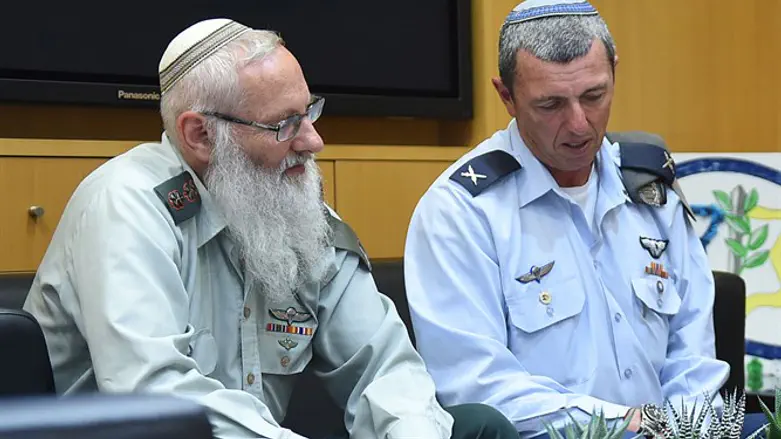
The storm surrounding the joint service order and expanding mixed-gender battalions, including a forth battalion under the command of a religious commander is not fading from the public agenda.
Words of harsh censure were recently spoken by Rabbi Zalman Melamed, Rabbi Dov Lior, Rabbi Shlomo Aviner, Rabbi Zvi Israel Tau, and others.
It has emerged that before the order's issuance the military rabbinate drafted clear rules regarding the conduct of men and women in the IDF, rules that are not in any way compatible with the new order.
In all issues having to do with mixed-gender combat, the booklet clearly delineates a ban against a male and a female soldier performing guard duty alone or conducting joint operational activities that could encourage intimacy between the sexes, and as such precludes any possibility of serving in a mixed battalion.
The booklet also dedicates a significant chapter to discuss the hotly debated issue of women singing in the army. The Joint Service Order does not exempt soldiers from any activity considered to be heritage education or from military memorial ceremonies, even if they include women singing. Decisions regarding other activities will be subject to the commander's discretion.
The document also deals with training female soldiers, doctors, or medics on how to protect themselves and what the permissible boundaries are in laws dealing with seclusion, contact, mixed service, and combat service. Recently an increase in sexual harassment in the army has been reported.
With the publication of the new joint service command, many media outlets attempted to obtain the Chief Army Rabbi's response and official position on the order's findings, conclusions, and recommendations, but to no avail. In order for the Chief Army Rabbi to speak his mind openly and without fear he needs the IDF Spokesman who is authorized to allow or disallow such interviews. The IDF, however, has adopted an exclusionary tactic and has long not allowed the Chief Rabbi to be interviewed and to express his religious position.
Thus, despite the fact that the controversy surrounding the Joint Service Order has existed for a long time, one still does not know the position of the military rabbinate and its head, and one can not know the laws that a soldier or officer serving as part of a mixed unit must uphold, what is allowed and what is not, what a soldier who maintains a religious lifestyle must do in various situations.
Also, the IDF Rabbinate has not published the rights of observant soldiers regarding forced service in mixed brigades, and there is no clear definition of who is a religious soldier and who is not, and of the status of soldiers who identify as "traditional" or "observant" ("masorati" or "shomer mitzvot").
For reasons that are not clear, the Laws of Modesty booklet has not been distributed to the public nor to the military chaplains themselves, but Arutz Sheva has obtained a document that reached Advanced and Hesder yeshiva heads, which contrasts the Modesty Laws as taught in the IDF rabbinate's booklet with the actual commands mandated in the Joint Service Order.
To read the full document in Hebrew, click here.